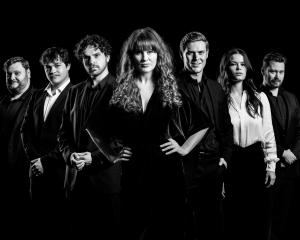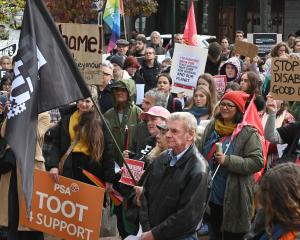While he says there is a definite resurgence of interest in Maori culture and language, he fears the traditions are "decaying beyond repair". The number of children at kohanga reo Maori language preschools is declining, a new generation of elders is coming through without in-depth knowledge of marae and cultural traditions.
But Prof Tapsell is in a position to influence change. He started a new role last month as head of Te Tumu, the University of Otago's school of Maori, Pacific and Indigenous Studies, and has Fridays off to continue a research project through the James Henare Maori Research Centre at the University of Auckland.
He and other researchers, including his wife Dr Merata Kawharu, are trying to develop an education programme for emerging Maori elders which they hoped will attract some government funding.
"Elders are kin accountable. They need to know the intergenerational traditions and be able to pass them on."
The Tapsells are committed to preserving Maori traditions.
They speak Maori at home and Maori is the first language for their children, son Piere (5) and daughter Freda (2), who attend total immersion Maori language schools. Prof Tapsell says it is difficult for Maori language speakers.
"Where can you go where Maori is the only language spoken? English is everywhere."
Although he was well aware of his Tapsell and Te Awara iwi roots - he is the nephew of orthopaedic surgeon turned MP (and later Speaker of the House) Sir Peter Tapsell - he says it was not until 1990 that his Maori relatives began looking to him to become a caretaker of their traditions and the historian of the family taonga (treasures).
He was 28, had completed a BA in anthropology at the University of Auckland and had been appointed the curator of Maori exhibits at the Rotorua Museum of Art and History.
"All these relatives starting coming out of the woodwork - uncles, aunties, great uncles and great aunties. They became my mentors. They wrapped themselves around me."
Prof Tapsell did not speak more than a smattering of Maori then. But his relatives spoke to him in Maori, translating information into English when they felt they needed to, expecting him to learn Maori quickly to keep up with them.
That he did, without formal lessons.
"They were very patient with me."
There was a particular reason why the younger Tapsells' first language was English, Prof Tapsell says. His grandfather, Kouma Te Omeka Whakamutunga Ngaherehere (Tapihana) Tapsell, who was seriously wounded fighting for New Zealand at Gallipoli, was unable to claim a war veteran's pension because Maori soldiers were not eligible. Despite life-long ill health, he dug ditches and did other manual work to feed his family, wife Enid (the daughter of Irish-Catholic immigrants) and five sons.
"He didn't want that sort of life for his children so Maori was not spoken at home and education was everything. English was spoken because that was the language of survival."
He says it was not until many years later he learnt his grandfather spoke Maori eloquently.
"I was told that he was an orator second-to-none on the marae. But his sons were not allowed on the marae with him. One of my uncles told me he would drive my grandfather to the marae and wait for him outside in the car."
After leaving the Rotorua Museum in 1994, Prof Tapsell gained an MA in anthropology, completed a PhD at the Pitt Rivers Museum at the University of Oxford while his wife was a Rhodes Scholar at Oxford, and most recently has been Tumuaki Maori (Maori director) and second in charge at the Auckland Museum.
He has been a researcher with the University of Auckland since 2000. One of his most recent achievements was curating "Ko Tawa", an exhibition of national taonga, and writing the book which accompanied it.
Now he is in Dunedin - a city which he says still has a strong community feel and where he already feels at home, not least because he says he considers the Otago Museum to the best regional museum and one of his top three public spaces in the country (the others are in Porirua and Tauranga).
He is also keen to build research links between Te Tumu and the Hocken Collections library, which he says holds a wealth of information about 19th century Maori which has not yet been analysed in depth.
Prof Tapsell says he senses an enthusiasm among his staff he has rarely felt in the workplace before.
"My first priority is standing still to give myself time to develop relationships and survey the lie of the land. That way I will learn how best to serve my young, energetic staff and how best Te Tumu might [link to] the rest of the university."
He hopes to develop links with other departments so there is a Maori connection to all disciplines. Maori culture and language are important for all students, and for New Zealand as a whole, he says.
"It is a culture developed over thousands of years and it is our point of difference to anywhere else in the world."
Advertisement













